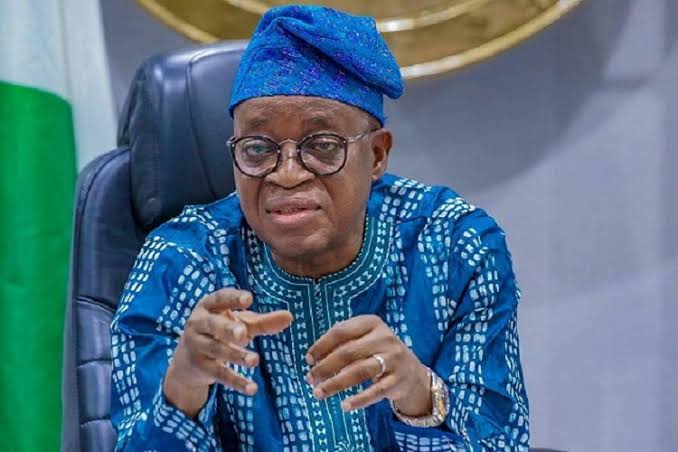
In May 2023, just a few days to the swearing in of President Bola Tinubu, the then-Minister of Transportation; Alhaji Mu’azu Jaji Sambo threw his weight behind the long agitation for the creation or a Ministry to oversee the nation’s rich maritime and related industry.
Occasion was the investiture of Mr. Aminu Umar as the President of Nigerian Chamber of Shipping. He canvassed that having a Ministry of Maritime Affairs will enable the nation realize the enormous potentials in the sector.
He pointedly told the elite gathering that: “ I agree that there should be and there must be a separate Ministry of Maritime Affairs. This is because Nigeria has no business depending on oil. The maritime industry in the country is big enough to guaranty economic prosperity for the nation.”
For so many years, stakeholders in the industry clamoured for a maritime ministry. They suggested that a maritime affairs ministry should be created by the government saying that it will enhance the sector and engender economic growth.
And when we their prayers were answered, it came in a more encompassing manner. The maritime ministry has Blue Economy as an addition.
The fact is that the blue economy holds a great potential for the country. It represents the unfolding fact that Nigeria’s exploration of the untapped potentials within the blue economy is yet untapped.
The Word Bank says the Blue Economy is the “sustainable use of ocean resources for economic growth, improved livelihoods, and jobs while preserving the health of the ocean ecosystem”.
In a very simple language, the blue economy encompasses all economic activities related to oceans, seas, and other bodies of water. These assets also include various sectors such as fisheries, aquaculture, maritime transport, renewable energy, tourism, and mineral resources.
Nigeria is no doubt, blessed with an extensive coastline and abundant water resources, and a huge potential within the blue economy.
All the potentials in the nation’s vats blue economy have remained untapped. This is what the new Minister has been appointed to explore and exploit.
By the creation of the Blue Economy Ministry, Nigeria has joined the league of countries which have committed to the Blue Economy concept.
Having stated the above, may we state here that the new Minister will be expected to move out of the nation out of the stereotype and restrictive maritime business?
No doubt, by the creation of the Blue Economy Ministry, Nigeria has joined the league of countries which have committed to the Blue Economy concept.
The new Ministry, by its nomenclature, is much bigger and deeper than maritime and shipping. It is a huge leap from the age-long concentration on ships and shipping and associated businesses.
We agree with experts who have posited that to achieve the objectives of its creation, the minister must know that blue economy must develop the Nigerian inland waterways, coastal shipping and revamp maritime logistics, create new job opportunities and even reduce logistics costs, particularly haulage of goods and farm produce across the country.
In addition to the above, the new ministry must focus on renewable ocean energy, fisheries and aquaculture, safety of navigation, while building seaports and shipping; working on marine biotechnology research and development; enhancing marine tourism and cruise tourism; exploring offshore hydrocarbons and seabed minerals.
Unlike some others who have their jobs cut out for them, the new Minister; Mr Gboyega Oyetola will have to learn the curves and eventually knit the traditional marine business with the equally and perhaps more lucrative blue economy.
There is no overemphasizing the fact the traditional maritime industry subsectors have their legion of challenges. The Minister may need to ‘redesign’ the ministry to align with the realities of the blue economy and the challenges to deliver on his mandate as the Minister in charge.
The ports are in need of infrastructure upgrade. Almost all the ports have aged and lacking modern infrastructure. The management of the Nigerian Ports Authority has spelt out how this can be handled. The Minister needs to look at the options, which include seeking facilities from institutions to finance these projects, which we are told will cost as much as $800Million. The management of NPA has assured that there would be no problem with repayment of the loans from revenues earned by the agency.
One contentious issue that will require the sagacity of the Minister is the renewal of the concessions of the various terminal operators at the ports. There are allegations of abuse and non-adherence to terms and conditions of the contractual agreements.
There is need for attention to the numerous plight of Nigerian ship owners; especially, the need for disbursement of the Cabotage Vessel Finance Fund. This is the simplest task to accomplish, if political will is there.
Nigerian seafarers are largely unemployed, because the fleet of ships owned by Nigerian have largely depleted. There is need to take a critical look at the National Seafarers Development Programme. It is a well-intended programme, but, it is being abused and requires an overhaul.
Perhaps, it is time to take a look at the controversial but necessary passage of the National Transport Commission Bill. The new Minister will do well to take another look at this Bill, the potentials are enormous. It was killed owing a rivalry, and an overlapping of roles by agencies under the ministry. We urge the Minister to look at this.















